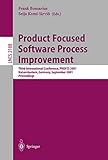Product Focused Software Process Improvement [electronic resource] : Third International Conference, PROFES 2001 Kaiserslautern, Germany, September 10–13, 2001 Proceedings / edited by Frank Bomarius, Seija Komi-Sirviö.
Material type: TextSeries: Lecture Notes in Computer Science ; 2188Publisher: Berlin, Heidelberg : Springer Berlin Heidelberg, 2001Description: XII, 388 p. online resourceContent type: text Media type: computer Carrier type: online resourceISBN: 9783540448136Subject(s): Computer science | Software engineering | Information Systems | Management information systems | Computer Science | Software Engineering | Management of Computing and Information Systems | Computers and Society | Business Information SystemsAdditional physical formats: Printed edition:: No titleDDC classification: 005.1 LOC classification: QA76.758Online resources: Click here to access online
TextSeries: Lecture Notes in Computer Science ; 2188Publisher: Berlin, Heidelberg : Springer Berlin Heidelberg, 2001Description: XII, 388 p. online resourceContent type: text Media type: computer Carrier type: online resourceISBN: 9783540448136Subject(s): Computer science | Software engineering | Information Systems | Management information systems | Computer Science | Software Engineering | Management of Computing and Information Systems | Computers and Society | Business Information SystemsAdditional physical formats: Printed edition:: No titleDDC classification: 005.1 LOC classification: QA76.758Online resources: Click here to access online  E-BOOKS
E-BOOKS
| Current library | Home library | Call number | Materials specified | URL | Status | Date due | Barcode |
|---|---|---|---|---|---|---|---|
| IMSc Library | IMSc Library | Link to resource | Available | EBK5025 |
Keynote Address -- Guaranteed Software Quality -- Building an Experience Base for Software Engineering: A Report on the First CeBASE eWorkshop -- A Contingency Approach to Software Development -- Career-Long Education for Software Professionals: A US View of the Educational Challenges in a Rapidly-Changing Technology -- Quality of Software -- Cognitive Structures of Software Evaluation: A Means-End Chain Analysis of Quality -- Requirements Evolution From Process to Product Oriented Management -- Software Process Assessment and Improvement -- A Case Study on Scenario-based Process Flexibility Assessment for Risk Reduction -- Contexts of KM Based SPI: The Case of Software Design Experience Reuse -- Models and Success Factors of Process Change -- Process Improvement in Turbulent Times — Is CMM Still an Answer? -- Assessment of Maintenance Maturity in IT Departments of Public Entities: Two Case Studies -- Evaluating a Usability Capability Assessment -- Organizational Learning and Experience Factory -- Building an Experience Base for Software Engineering: A Report on the First CeBASE eWorkshop -- Experience Magnets Attracting Experiences, Not Just Storing Them -- Improving Knowledge Management in Software Reuse Process -- Processes and Knowledge Management: A Symbiosis -- Augmenting Experience Reports with Lightweight Postmortem Reviews -- A Tool for Managing Software Development Knowledge -- Industrial Experiences and Case Studies -- Starting Improvement of Requirements Engineering Processes: An Experience Report -- A Family-Oriented Software Development Process for Engine Controllers -- Enabling Local SPI in a Multi-National Company -- Project Improvement as Start-up -- Software and Process Modeling -- LIPE:A Lightweight Process for E-Business Startup Companies Based on Extreme Programming -- Evaluation of the E3 Process Modelling Language and Tool for the Purpose of Model Creation -- Describing Fractal Processes with UML -- Extending the Software Process Culture - An Approach Based on Groupware and Workflow -- Towards Systematic Knowledge Elicitation for Descriptive Software Process Modeling -- Modular Process Patterns Supporting an Evolutionary Software Development Process -- Empirical Software Engineering -- A Classification Scheme for Studies on Fault-Prone Components -- Program Understanding Behavior During Estimation of Enhancement Effort on Small Java Programs -- Evaluation of a Business Application Framework Using Complexity and Functionality Metrics.
The Third International Conference on Product Focused Software Process Improvement (PROFES 2001) continued the success of the PROFES’99 and PROFES 2000 conferences. PROFES 2001 was organized in Kaiserslautern, Germany, September 10 13, 2001. The PROFES conference has its roots in the PROFES Esprit project (http://www.ele.vtt.fi/profes/), but it quickly evolved into a full fledged general purpose conference in 1999 and since then it has gained wide spread international popularity. As in previous years, the main theme of PROFES 2001 was professional software process improvement (SPI) motivated by product and service quality needs. SPI is facilitated by software process assessment, software measurement, process modeling, and technology transfer and has become a practical tool for quality software engineering and management. The conference addresses both the solutions found in practice as well as relevant research results from academia. The purpose of the conference is to bring to light the most recent findings and results in the area and to stimulate discussion between the researchers, experienced professionals, and technology providers for SPI.


There are no comments on this title.